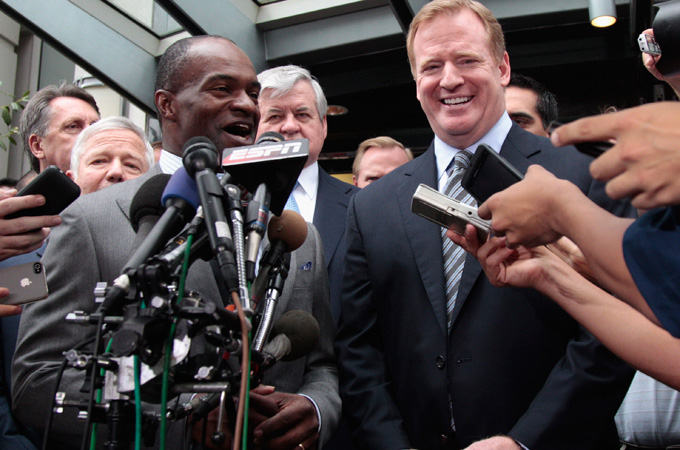When sport goes on strike
The last few months have seen the spread of strike action from America to Europe, is this a sign of things to come?

 |
| NFL’s DeMaurice Smith and Roger Goodell smile as lockout ends but will all disputes be amicably solved [GALLO/GETTY] |
If in doubt, walk out!
That seems to be the mantra of many professional athletes right now in a year when threatened or actual industrial action has become the norm as unions strive to have management accede to players’ demands.
In the United States, it took four and a half months for the NFL lock-out to be resolved. Fortunately, the dispute only cost the teams the bulk of the off-season and was brought to an end in time for training camps, exhibition games, and of course the regular season to go ahead unaffected.
But the threat was there, and enough for the players and team owners to get off their high horses in order to reach a compromise.
The new 10-year collective bargaining agreement granted the owners their wish to receive a larger share of league revenues, 52% as opposed to the previous 47%, but the $120 million per team salary cap arrangement (with an additional $20 million for benefits) and a mandatory provision for 89% of the cap to be spent, meant the players also came up smelling of roses, turning this dispute into a high scoring draw.
Barely had the battle lines been erased in the NFL dispute than the NBA wars hit the headlines. The league is currently in the midst of its first labour stoppage since 1999, and, even though it’s not yet time for the season to begin, there are genuine fears that, come the scheduled tip-off, it won’t.
The crux of the matter, as in the NFL dispute, is money, with the owners’ desiring more of it. Their bid for a larger share is motivated in part by their desire to compensate for last season’s $300 million loss – which they obviously don’t want to bear the brunt of again.
Meanwhile, the players are resisting a hard salary cap and statutory limitations on their earnings, which will top-out at $2 billion dollars per season over the 10 years of the new deal if the owners get their way.
The result, at the time of writing, is an impasse with neither side showing any sign of backing down. So, with the new season on a knife-edge, let’s call it a no win situation.
Across the pond
Spanish football suffered its first strike in some 27 years when the players in the top two divisions opted not to appear in the scheduled season-openers in protest at the more than $70 million dollars in unpaid wages that some 200 of them were missing. They also wanted salary protection for all, and the freedom to break their contracts if they went unpaid for three months.
Of course, while the strike was solid, the support of players at Real Madrid and Barcelona was somewhat ironic, as their clubs’ insistence on taking the lion’s share of TV revenue is part of the reason that the other clubs are so cash strapped.
In the end though, the solution benefitted all the players, however fat their wallets. And, as the league appears to have caved in on all the demands, I’ll score this 1-0 to the players.
No sooner had Spanish football returned to the schedule than Italian football replaced it on the sidelines. The players’ union and the clubs union having failed to agree on key issues in a new collective bargaining agreement that was due to be reached at the end of last season.
The stand-off centers on the clubs’ apparent desire to force unwanted players into a move in the last year of their contracts, and the practice of making those in a contract dispute train away from the first team.
 |
| La Liga stars went on strike when the League refused to pay millions owed to players [GALLO/GETTY] |
Another sticking point concerns a push to have the highest earning players pay a new so-called “solidarity tax”, which was imposed by the Italian government for all the nation’s top-earners as an austerity measure.
In the past, some big-name players have negotiated to have their taxes paid by the club, so footing the bill for this new tax themselves would represent a loss of earnings; hence their alleged reluctance.
According to expert opinion, both sides appear to be digging in, consequently, this one seems to be heading for extra-time.
So, it’s certainly been a summer of discontent in some corners of the sporting world, and one wonders whether it’s the shape of things to come.
Sport, for so long apparently in denial about the financial state we’re in, is now starting to feel the pinch like everyone else.
Of course, the top players, coaches, owners, and officials operate at a far higher socio-economic level than you and I, but it’s now a fact that all the uncertainties many of us endure on a daily basis are now equally applicable to sport, with the result that self-preservation instincts have kicked in with a vengeance, and the fight for a piece of the ever diminishing pie has never been more fierce.
Terry Baddoo is a freelance sports writer/broadcaster and former CNN anchor currently based in Atlanta, USA.
Follow Terry Baddoo on Twitter @terrybaddoo1.